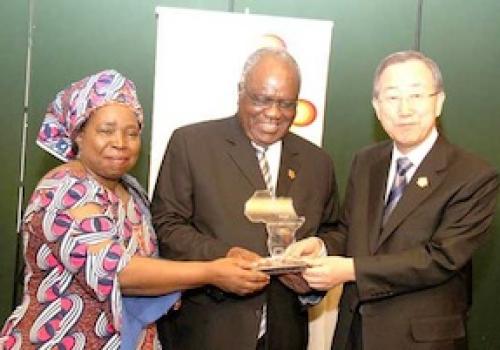Five SADC countries namely: South Africa, Swaziland, Zambia, Namibia and Mozambique received the 2013 African Leaders Malaria Alliance Award (ALMA) Award during African Union Summit held in Addis-Ababa in January 2013.
This big success is the expression of the commitment of SADC Member States to eliminate Malaria in at least 6 countries by 2015 and is a result of the harmonization of some malaria interventions such as the use of DDT for vector control in the region, the use of bed nets and the improvement of the malaria case management in terms diagnostic and treatment. Few initiatives have been developed by SADC in order to bring together SADC Member States for the best control of Malaria in the region. Among others, the SADC Malaria Strategic Framework, the SADC Malaria Elimination Framework, the SADC Malaria Advocacy and Communication Strategy, SADC Malaria Minimum Standards for Prevention, Treatment and Management of Malaria.
In addition, SADC is actually implementing the Elimination 8(E8) which is an initiative for Malaria Elimination in 8 Member States comprising four front line countries: Botswana, Namibia, South Africa and Swaziland and four second line countries: Angola, Mozambique, Zambia and Zimbabwe. The incidence of Malaria in the four first line countries of elimination is almost less than 1 case par 1000 people per year.
Another fact which pushed this success is the Malaria Cross Border Collaboration between Member States as emphasized by the President Jocob Zuma in his speech, particularly the Lubombo one, which is a collaboration between Mozambique, South Africa and Swaziland.
In order to keep this advantage, there is a need for the SADC region to strengthen the other cross border malaria initiatives in the area of E8 such as the trans Kunene (Collaboration between Angola and Namibia), the trans Zambezi(Collaboration between Angola, Botswana, Namibia, Zambia and Zimbabwe) and the MOZIZA(Collaboration between Mozambique, South Africa and Zimbabwe); to find a way for the local production of malaria commodities and DDT and to come up with an innovative financing system for the sustainability of the Malaria Programme taking into account the multisectoral aspect of the disease.
African Heads of State and government committed to increase their domestic contributions to public health including malaria control. This includes raising new revenues through innovative financing mechanisms, including introducing levies on financial transactions and airline tickets.
To address the malaria emergency threatening Africa, ALMA leaders will work with donors and development partners to explore emergency financing mechanisms that can bridge the financing gap, including the Global Fund, the World Bank, BRICS, United States, United Kingdom, UNITAID, African Development Bank, private sector, foundations, and others. Ministers of Finance will convene a meeting alongside the International Monetary Fund/World Bank Spring Meetings in April 2013 to discuss mechanisms to fill outstanding gaps.
Mozambique is one of the 7 countries who received the 2013 ALMA Award for Excellence in Policy to have removed tariffs on antimalarial commodities, banned oral artemisinin-based mono-therapies, and introduced community case management of malaria. While Namibia, South Africa, Swaziland, and Zambia received the 2013 ALMA Award for Excellence in Impact and Implementation because they reduced malaria incidence by over 75% and increased coverage of at-risk populations with mosquito nets and/or Indoor Residual Spraying.
The award was given by UN Secretary General Ban Ki Moon and AU Commission chairperson Nkosazana Dlamini-Zuma and presented by immediate past chairperson Yayi Boni who is President of Benin during the closing ceremony of the AU 20th Ordinary Session summit
ALMA is a malaria project under the UN which helps African countries to combat malaria as one of the Millennium Development Goals (MDGs) whose target is set to be achieved by 2015.
Learn more about SADC initiatives related to non-communicable diseases.

